Environmental, Social, and Ethical Issues: A Sustainability Report
VerifiedAdded on 2023/06/03
|12
|1678
|64
Report
AI Summary
This report delves into the critical environmental issues of waste disposal and water scarcity that contemporary organizations, particularly in the hospitality sector, must address. It explores the ethical frameworks of utilitarianism and the common good approach as strategies for mitigating these challenges. The report examines how the utilitarian approach can guide waste reduction through practices like reducing plastic use and food waste distribution, while the common good approach can inform water conservation efforts through rainwater harvesting and water management plans. The report concludes by emphasizing the importance of managing environmental issues for organizational sustainability and long-term viability.
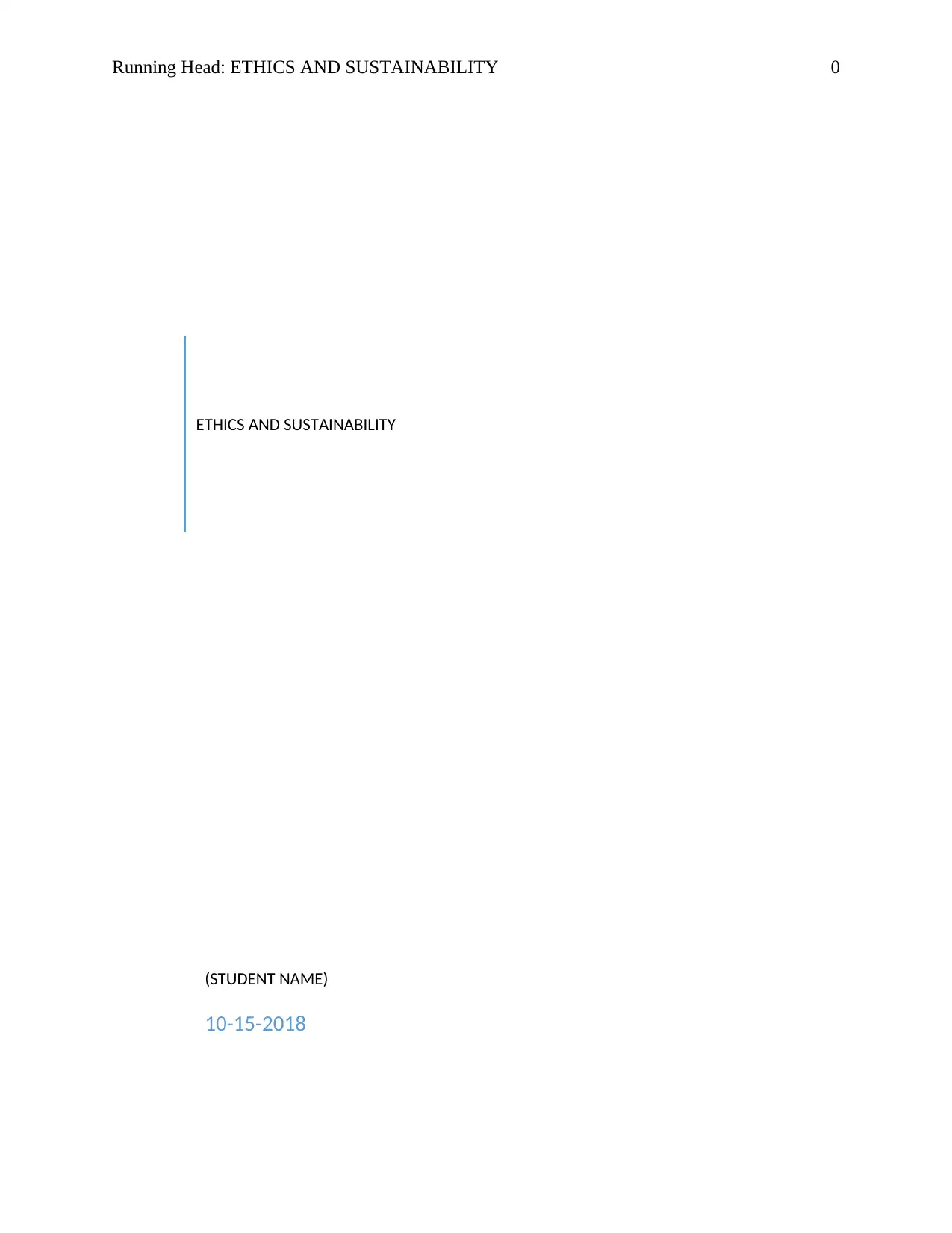
Running Head: ETHICS AND SUSTAINABILITY 0
ETHICS AND SUSTAINABILITY
(STUDENT NAME)
10-15-2018
ETHICS AND SUSTAINABILITY
(STUDENT NAME)
10-15-2018
Paraphrase This Document
Need a fresh take? Get an instant paraphrase of this document with our AI Paraphraser
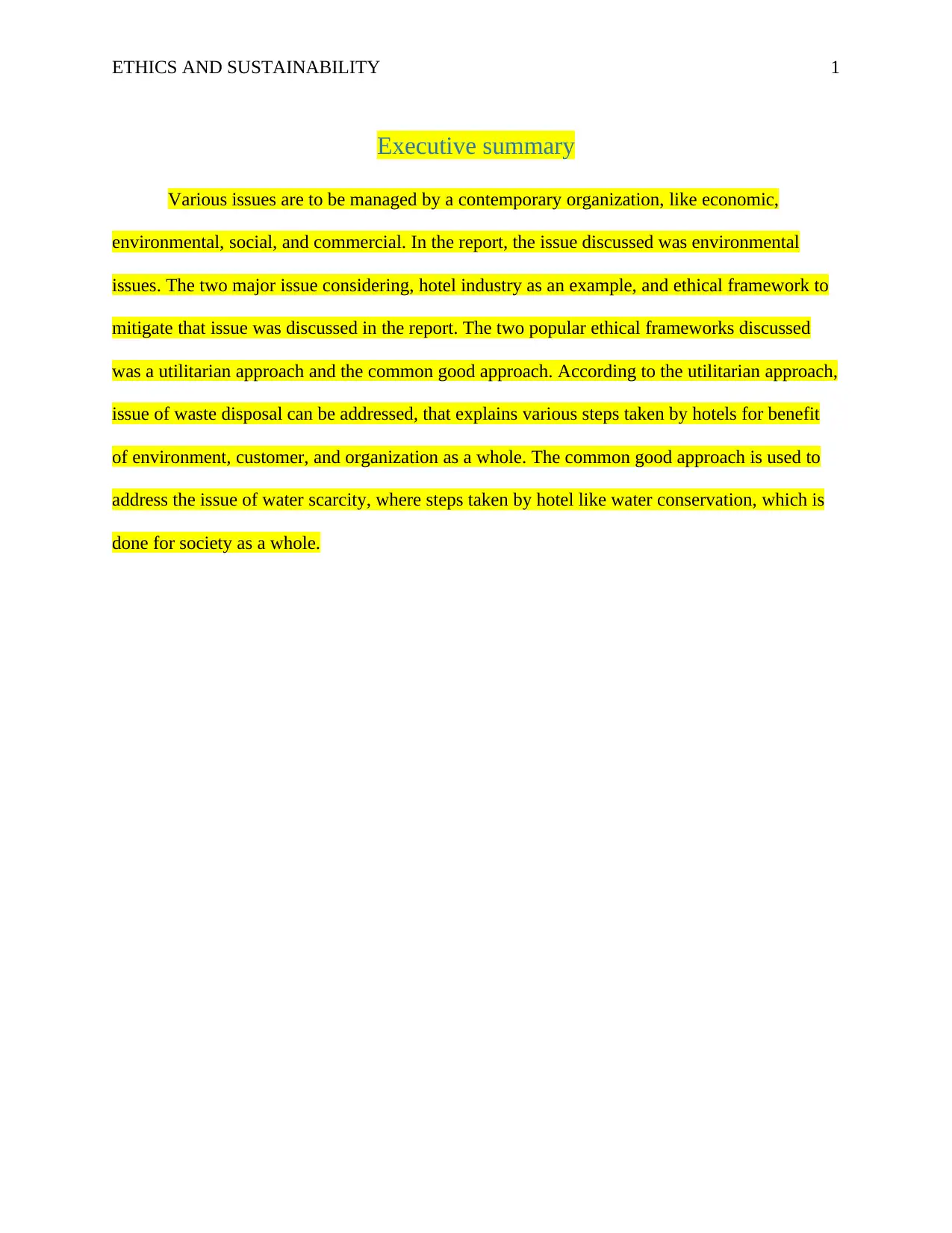
ETHICS AND SUSTAINABILITY 1
Executive summary
Various issues are to be managed by a contemporary organization, like economic,
environmental, social, and commercial. In the report, the issue discussed was environmental
issues. The two major issue considering, hotel industry as an example, and ethical framework to
mitigate that issue was discussed in the report. The two popular ethical frameworks discussed
was a utilitarian approach and the common good approach. According to the utilitarian approach,
issue of waste disposal can be addressed, that explains various steps taken by hotels for benefit
of environment, customer, and organization as a whole. The common good approach is used to
address the issue of water scarcity, where steps taken by hotel like water conservation, which is
done for society as a whole.
Executive summary
Various issues are to be managed by a contemporary organization, like economic,
environmental, social, and commercial. In the report, the issue discussed was environmental
issues. The two major issue considering, hotel industry as an example, and ethical framework to
mitigate that issue was discussed in the report. The two popular ethical frameworks discussed
was a utilitarian approach and the common good approach. According to the utilitarian approach,
issue of waste disposal can be addressed, that explains various steps taken by hotels for benefit
of environment, customer, and organization as a whole. The common good approach is used to
address the issue of water scarcity, where steps taken by hotel like water conservation, which is
done for society as a whole.
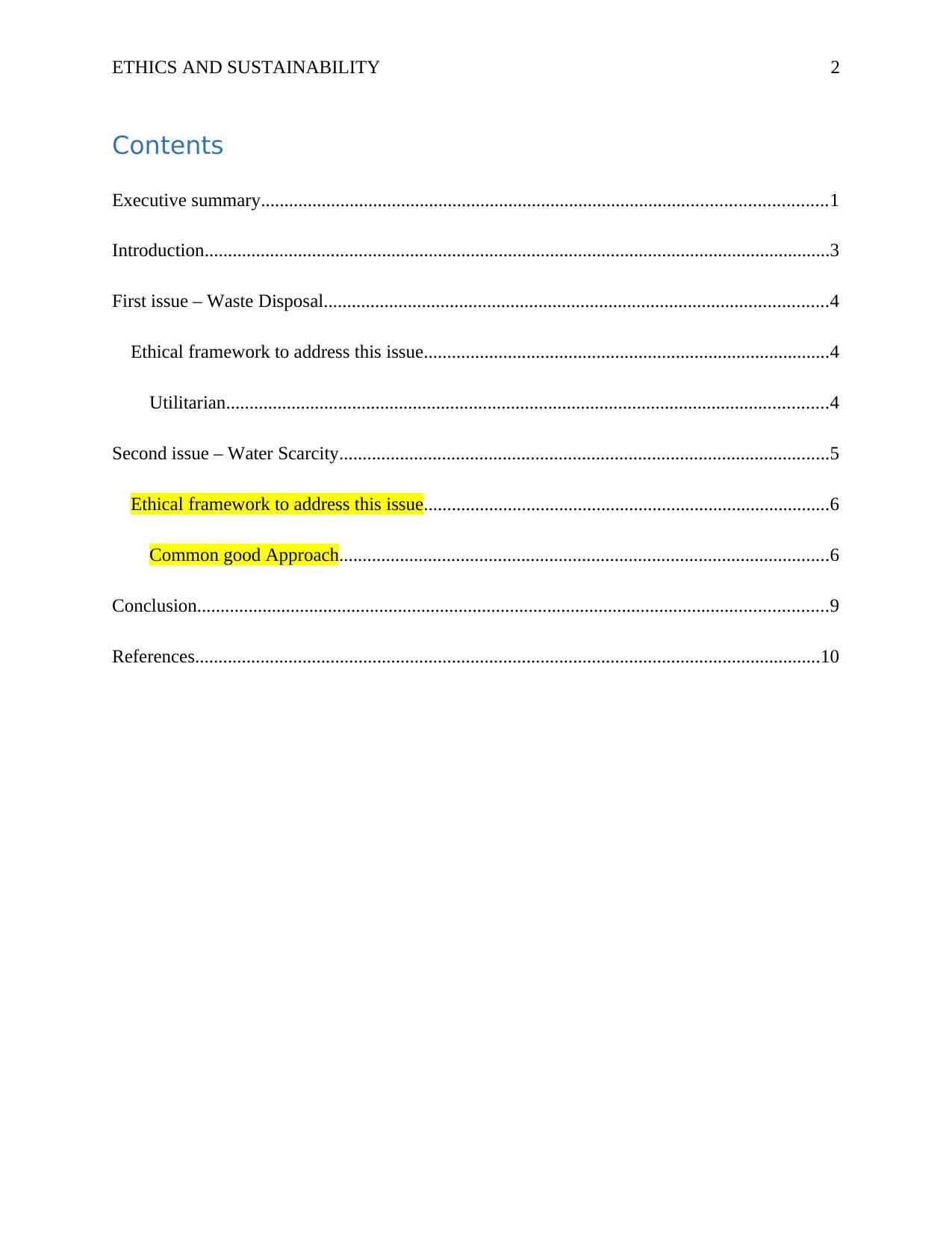
ETHICS AND SUSTAINABILITY 2
Contents
Executive summary.........................................................................................................................1
Introduction......................................................................................................................................3
First issue – Waste Disposal............................................................................................................4
Ethical framework to address this issue.......................................................................................4
Utilitarian.................................................................................................................................4
Second issue – Water Scarcity.........................................................................................................5
Ethical framework to address this issue.......................................................................................6
Common good Approach.........................................................................................................6
Conclusion.......................................................................................................................................9
References......................................................................................................................................10
Contents
Executive summary.........................................................................................................................1
Introduction......................................................................................................................................3
First issue – Waste Disposal............................................................................................................4
Ethical framework to address this issue.......................................................................................4
Utilitarian.................................................................................................................................4
Second issue – Water Scarcity.........................................................................................................5
Ethical framework to address this issue.......................................................................................6
Common good Approach.........................................................................................................6
Conclusion.......................................................................................................................................9
References......................................................................................................................................10
⊘ This is a preview!⊘
Do you want full access?
Subscribe today to unlock all pages.

Trusted by 1+ million students worldwide
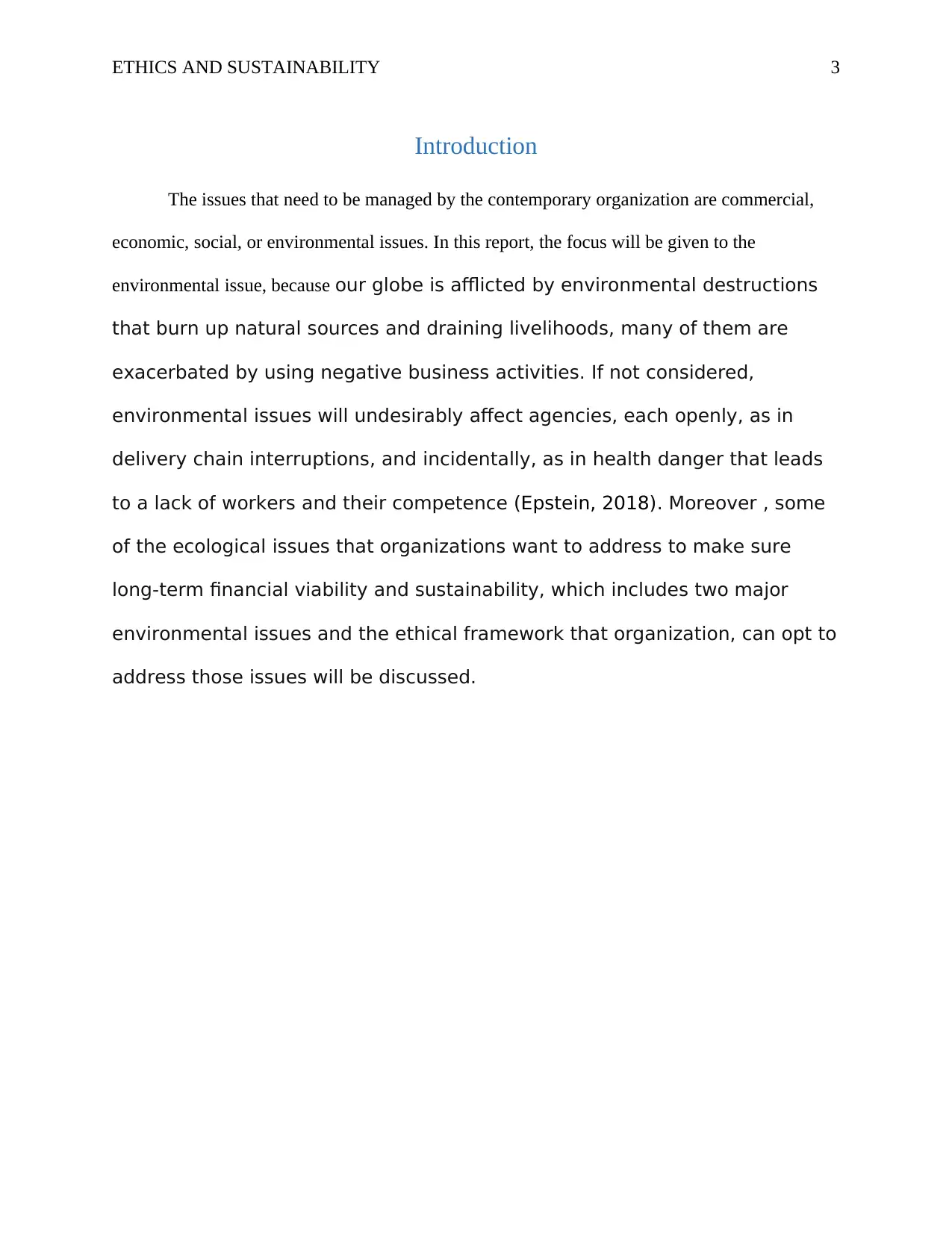
ETHICS AND SUSTAINABILITY 3
Introduction
The issues that need to be managed by the contemporary organization are commercial,
economic, social, or environmental issues. In this report, the focus will be given to the
environmental issue, because our globe is afflicted by environmental destructions
that burn up natural sources and draining livelihoods, many of them are
exacerbated by using negative business activities. If not considered,
environmental issues will undesirably affect agencies, each openly, as in
delivery chain interruptions, and incidentally, as in health danger that leads
to a lack of workers and their competence (Epstein, 2018). Moreover , some
of the ecological issues that organizations want to address to make sure
long-term financial viability and sustainability, which includes two major
environmental issues and the ethical framework that organization, can opt to
address those issues will be discussed.
Introduction
The issues that need to be managed by the contemporary organization are commercial,
economic, social, or environmental issues. In this report, the focus will be given to the
environmental issue, because our globe is afflicted by environmental destructions
that burn up natural sources and draining livelihoods, many of them are
exacerbated by using negative business activities. If not considered,
environmental issues will undesirably affect agencies, each openly, as in
delivery chain interruptions, and incidentally, as in health danger that leads
to a lack of workers and their competence (Epstein, 2018). Moreover , some
of the ecological issues that organizations want to address to make sure
long-term financial viability and sustainability, which includes two major
environmental issues and the ethical framework that organization, can opt to
address those issues will be discussed.
Paraphrase This Document
Need a fresh take? Get an instant paraphrase of this document with our AI Paraphraser
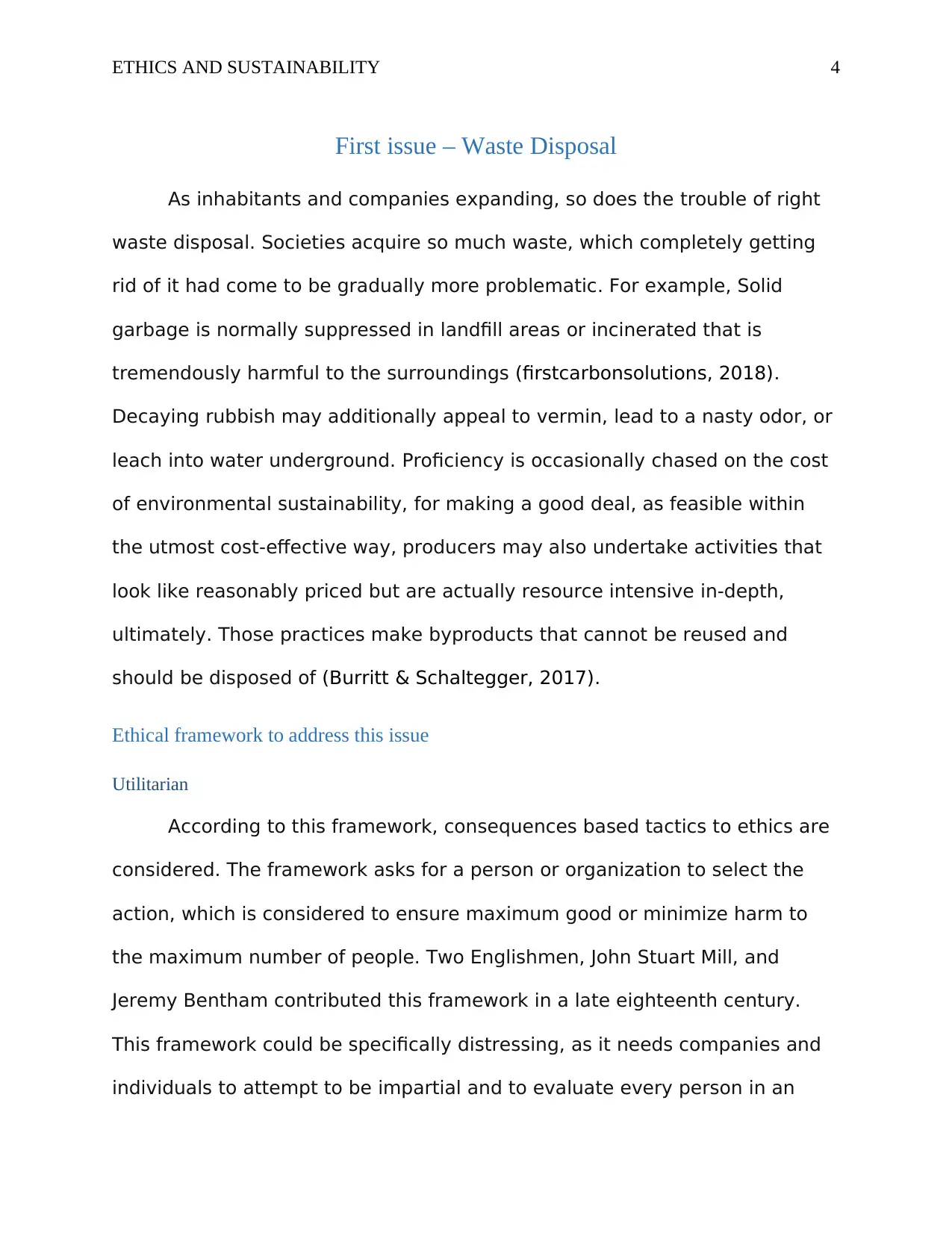
ETHICS AND SUSTAINABILITY 4
First issue – Waste Disposal
As inhabitants and companies expanding, so does the trouble of right
waste disposal. Societies acquire so much waste, which completely getting
rid of it had come to be gradually more problematic. For example, Solid
garbage is normally suppressed in landfill areas or incinerated that is
tremendously harmful to the surroundings (firstcarbonsolutions, 2018).
Decaying rubbish may additionally appeal to vermin, lead to a nasty odor, or
leach into water underground. Proficiency is occasionally chased on the cost
of environmental sustainability, for making a good deal, as feasible within
the utmost cost-effective way, producers may also undertake activities that
look like reasonably priced but are actually resource intensive in-depth,
ultimately. Those practices make byproducts that cannot be reused and
should be disposed of (Burritt & Schaltegger, 2017).
Ethical framework to address this issue
Utilitarian
According to this framework, consequences based tactics to ethics are
considered. The framework asks for a person or organization to select the
action, which is considered to ensure maximum good or minimize harm to
the maximum number of people. Two Englishmen, John Stuart Mill, and
Jeremy Bentham contributed this framework in a late eighteenth century.
This framework could be specifically distressing, as it needs companies and
individuals to attempt to be impartial and to evaluate every person in an
First issue – Waste Disposal
As inhabitants and companies expanding, so does the trouble of right
waste disposal. Societies acquire so much waste, which completely getting
rid of it had come to be gradually more problematic. For example, Solid
garbage is normally suppressed in landfill areas or incinerated that is
tremendously harmful to the surroundings (firstcarbonsolutions, 2018).
Decaying rubbish may additionally appeal to vermin, lead to a nasty odor, or
leach into water underground. Proficiency is occasionally chased on the cost
of environmental sustainability, for making a good deal, as feasible within
the utmost cost-effective way, producers may also undertake activities that
look like reasonably priced but are actually resource intensive in-depth,
ultimately. Those practices make byproducts that cannot be reused and
should be disposed of (Burritt & Schaltegger, 2017).
Ethical framework to address this issue
Utilitarian
According to this framework, consequences based tactics to ethics are
considered. The framework asks for a person or organization to select the
action, which is considered to ensure maximum good or minimize harm to
the maximum number of people. Two Englishmen, John Stuart Mill, and
Jeremy Bentham contributed this framework in a late eighteenth century.
This framework could be specifically distressing, as it needs companies and
individuals to attempt to be impartial and to evaluate every person in an
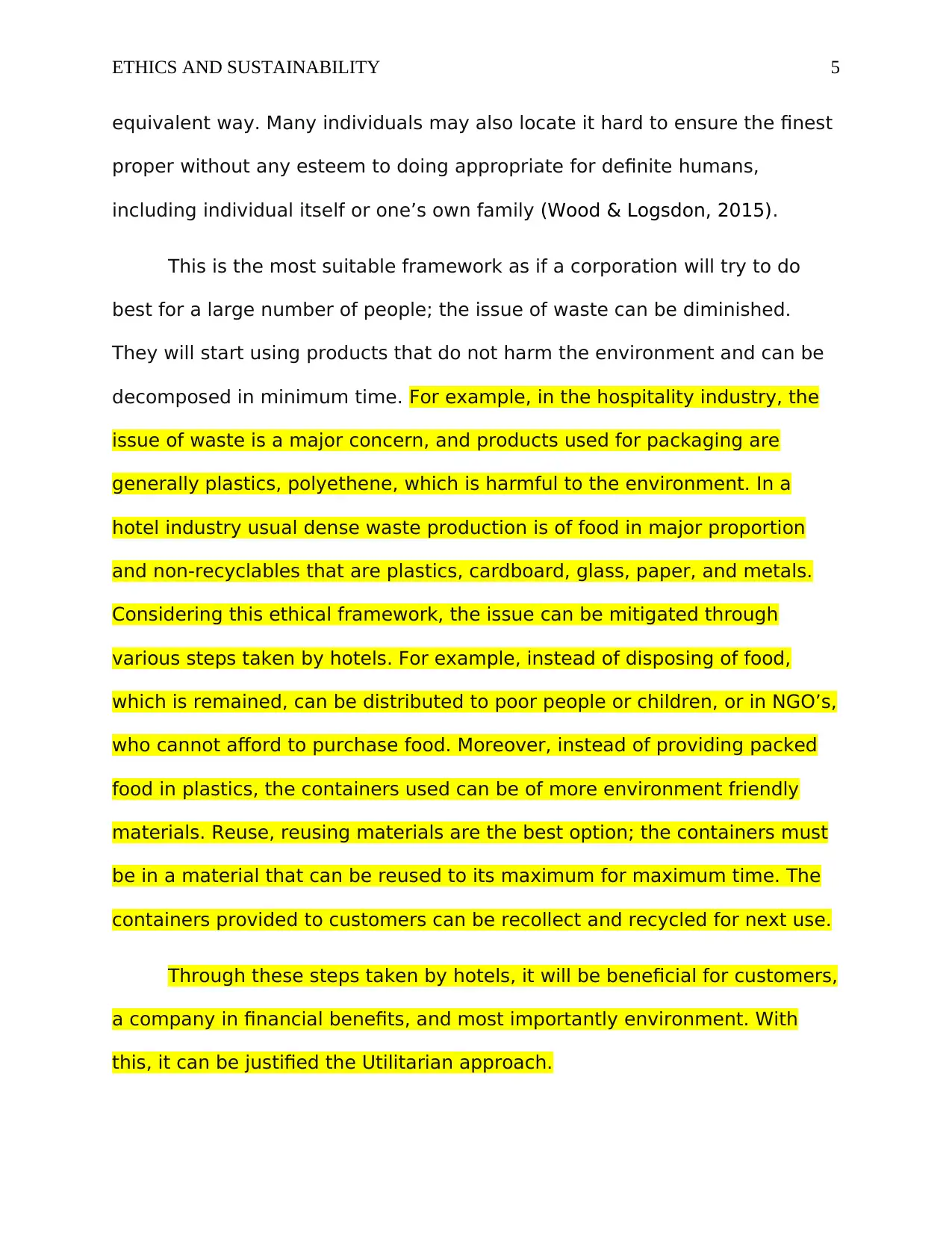
ETHICS AND SUSTAINABILITY 5
equivalent way. Many individuals may also locate it hard to ensure the finest
proper without any esteem to doing appropriate for definite humans,
including individual itself or one’s own family (Wood & Logsdon, 2015).
This is the most suitable framework as if a corporation will try to do
best for a large number of people; the issue of waste can be diminished.
They will start using products that do not harm the environment and can be
decomposed in minimum time. For example, in the hospitality industry, the
issue of waste is a major concern, and products used for packaging are
generally plastics, polyethene, which is harmful to the environment. In a
hotel industry usual dense waste production is of food in major proportion
and non-recyclables that are plastics, cardboard, glass, paper, and metals.
Considering this ethical framework, the issue can be mitigated through
various steps taken by hotels. For example, instead of disposing of food,
which is remained, can be distributed to poor people or children, or in NGO’s,
who cannot afford to purchase food. Moreover, instead of providing packed
food in plastics, the containers used can be of more environment friendly
materials. Reuse, reusing materials are the best option; the containers must
be in a material that can be reused to its maximum for maximum time. The
containers provided to customers can be recollect and recycled for next use.
Through these steps taken by hotels, it will be beneficial for customers,
a company in financial benefits, and most importantly environment. With
this, it can be justified the Utilitarian approach.
equivalent way. Many individuals may also locate it hard to ensure the finest
proper without any esteem to doing appropriate for definite humans,
including individual itself or one’s own family (Wood & Logsdon, 2015).
This is the most suitable framework as if a corporation will try to do
best for a large number of people; the issue of waste can be diminished.
They will start using products that do not harm the environment and can be
decomposed in minimum time. For example, in the hospitality industry, the
issue of waste is a major concern, and products used for packaging are
generally plastics, polyethene, which is harmful to the environment. In a
hotel industry usual dense waste production is of food in major proportion
and non-recyclables that are plastics, cardboard, glass, paper, and metals.
Considering this ethical framework, the issue can be mitigated through
various steps taken by hotels. For example, instead of disposing of food,
which is remained, can be distributed to poor people or children, or in NGO’s,
who cannot afford to purchase food. Moreover, instead of providing packed
food in plastics, the containers used can be of more environment friendly
materials. Reuse, reusing materials are the best option; the containers must
be in a material that can be reused to its maximum for maximum time. The
containers provided to customers can be recollect and recycled for next use.
Through these steps taken by hotels, it will be beneficial for customers,
a company in financial benefits, and most importantly environment. With
this, it can be justified the Utilitarian approach.
⊘ This is a preview!⊘
Do you want full access?
Subscribe today to unlock all pages.

Trusted by 1+ million students worldwide
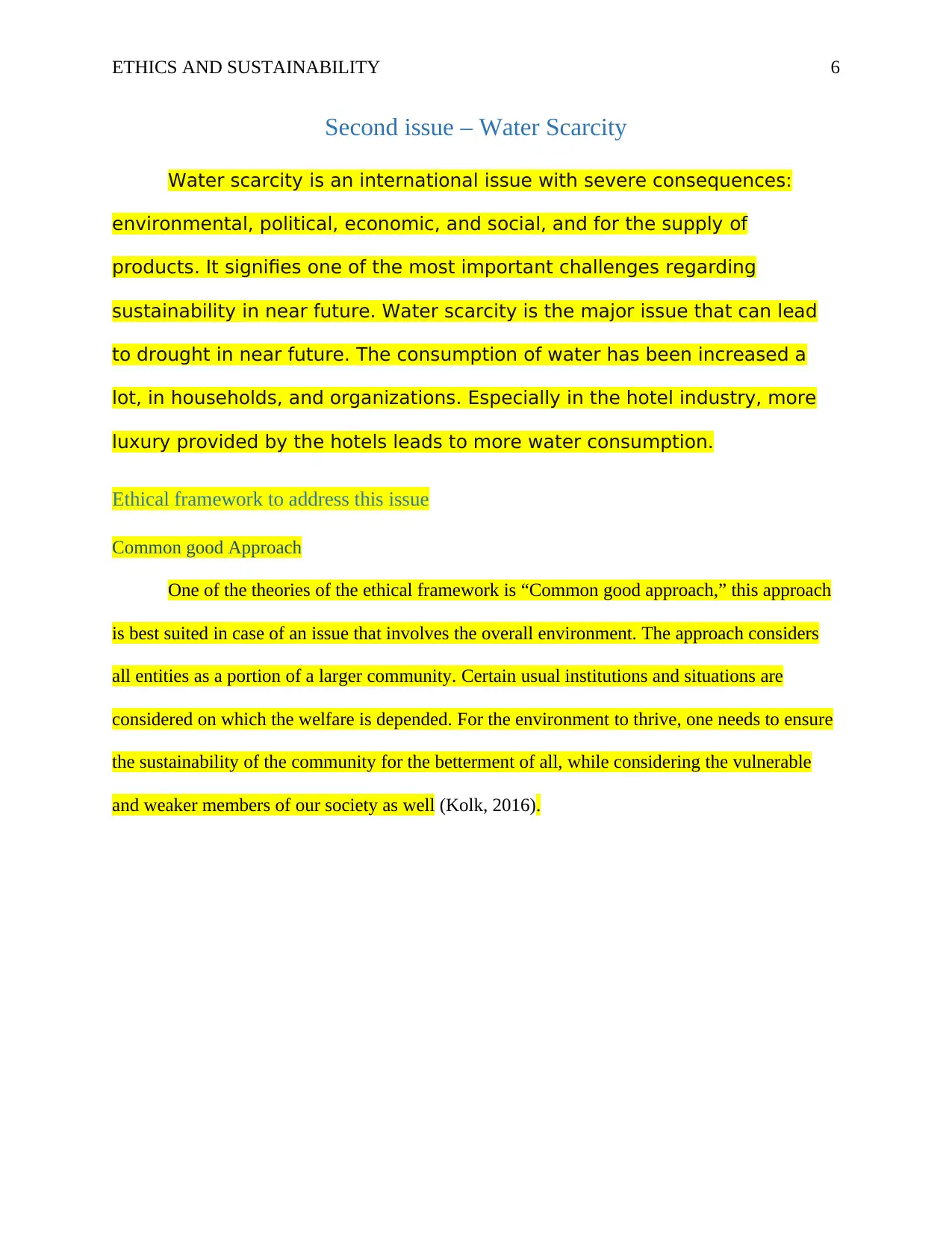
ETHICS AND SUSTAINABILITY 6
Second issue – Water Scarcity
Water scarcity is an international issue with severe consequences:
environmental, political, economic, and social, and for the supply of
products. It signifies one of the most important challenges regarding
sustainability in near future. Water scarcity is the major issue that can lead
to drought in near future. The consumption of water has been increased a
lot, in households, and organizations. Especially in the hotel industry, more
luxury provided by the hotels leads to more water consumption.
Ethical framework to address this issue
Common good Approach
One of the theories of the ethical framework is “Common good approach,” this approach
is best suited in case of an issue that involves the overall environment. The approach considers
all entities as a portion of a larger community. Certain usual institutions and situations are
considered on which the welfare is depended. For the environment to thrive, one needs to ensure
the sustainability of the community for the betterment of all, while considering the vulnerable
and weaker members of our society as well (Kolk, 2016).
Second issue – Water Scarcity
Water scarcity is an international issue with severe consequences:
environmental, political, economic, and social, and for the supply of
products. It signifies one of the most important challenges regarding
sustainability in near future. Water scarcity is the major issue that can lead
to drought in near future. The consumption of water has been increased a
lot, in households, and organizations. Especially in the hotel industry, more
luxury provided by the hotels leads to more water consumption.
Ethical framework to address this issue
Common good Approach
One of the theories of the ethical framework is “Common good approach,” this approach
is best suited in case of an issue that involves the overall environment. The approach considers
all entities as a portion of a larger community. Certain usual institutions and situations are
considered on which the welfare is depended. For the environment to thrive, one needs to ensure
the sustainability of the community for the betterment of all, while considering the vulnerable
and weaker members of our society as well (Kolk, 2016).
Paraphrase This Document
Need a fresh take? Get an instant paraphrase of this document with our AI Paraphraser
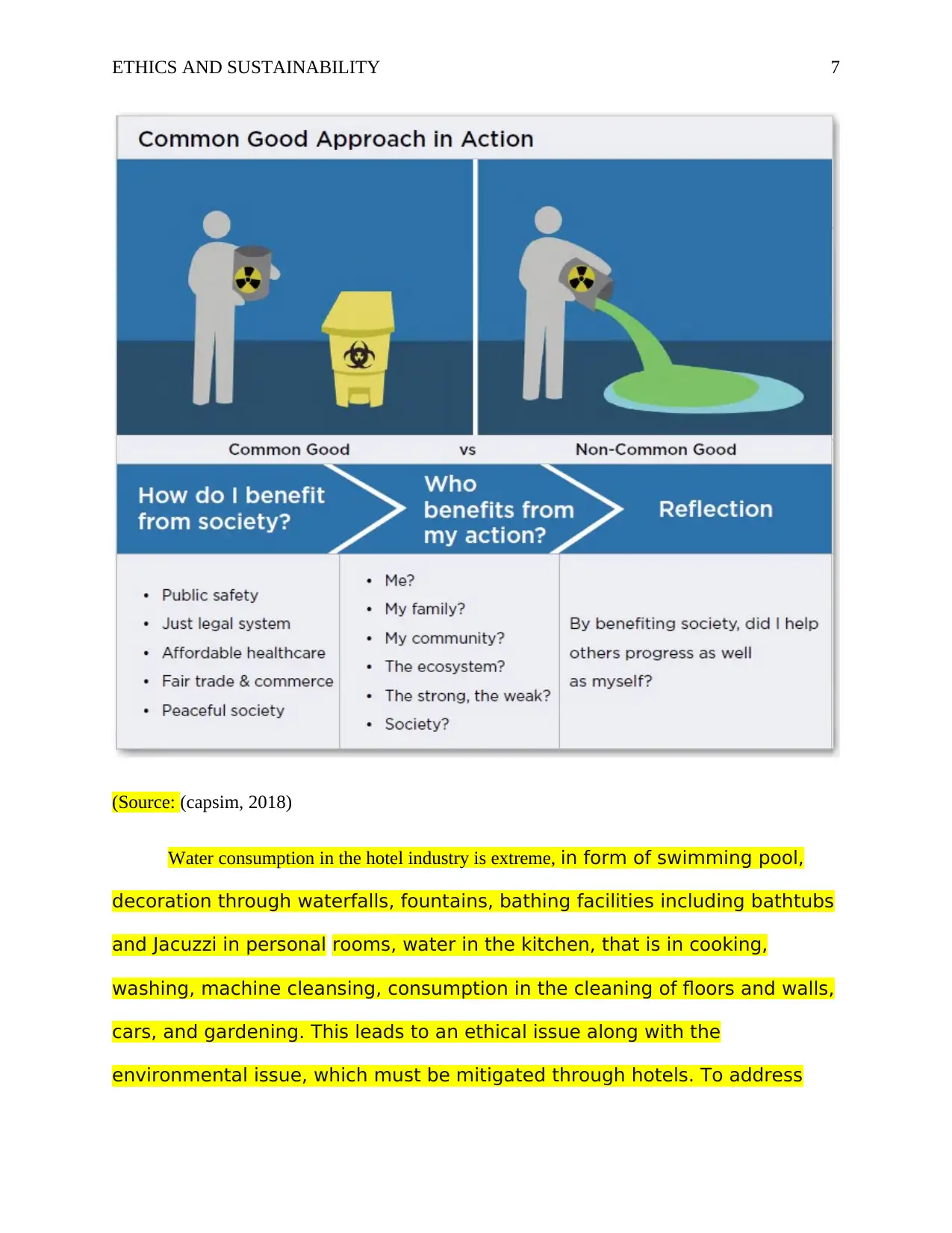
ETHICS AND SUSTAINABILITY 7
(Source: (capsim, 2018)
Water consumption in the hotel industry is extreme, in form of swimming pool,
decoration through waterfalls, fountains, bathing facilities including bathtubs
and Jacuzzi in personal rooms, water in the kitchen, that is in cooking,
washing, machine cleansing, consumption in the cleaning of floors and walls,
cars, and gardening. This leads to an ethical issue along with the
environmental issue, which must be mitigated through hotels. To address
(Source: (capsim, 2018)
Water consumption in the hotel industry is extreme, in form of swimming pool,
decoration through waterfalls, fountains, bathing facilities including bathtubs
and Jacuzzi in personal rooms, water in the kitchen, that is in cooking,
washing, machine cleansing, consumption in the cleaning of floors and walls,
cars, and gardening. This leads to an ethical issue along with the
environmental issue, which must be mitigated through hotels. To address
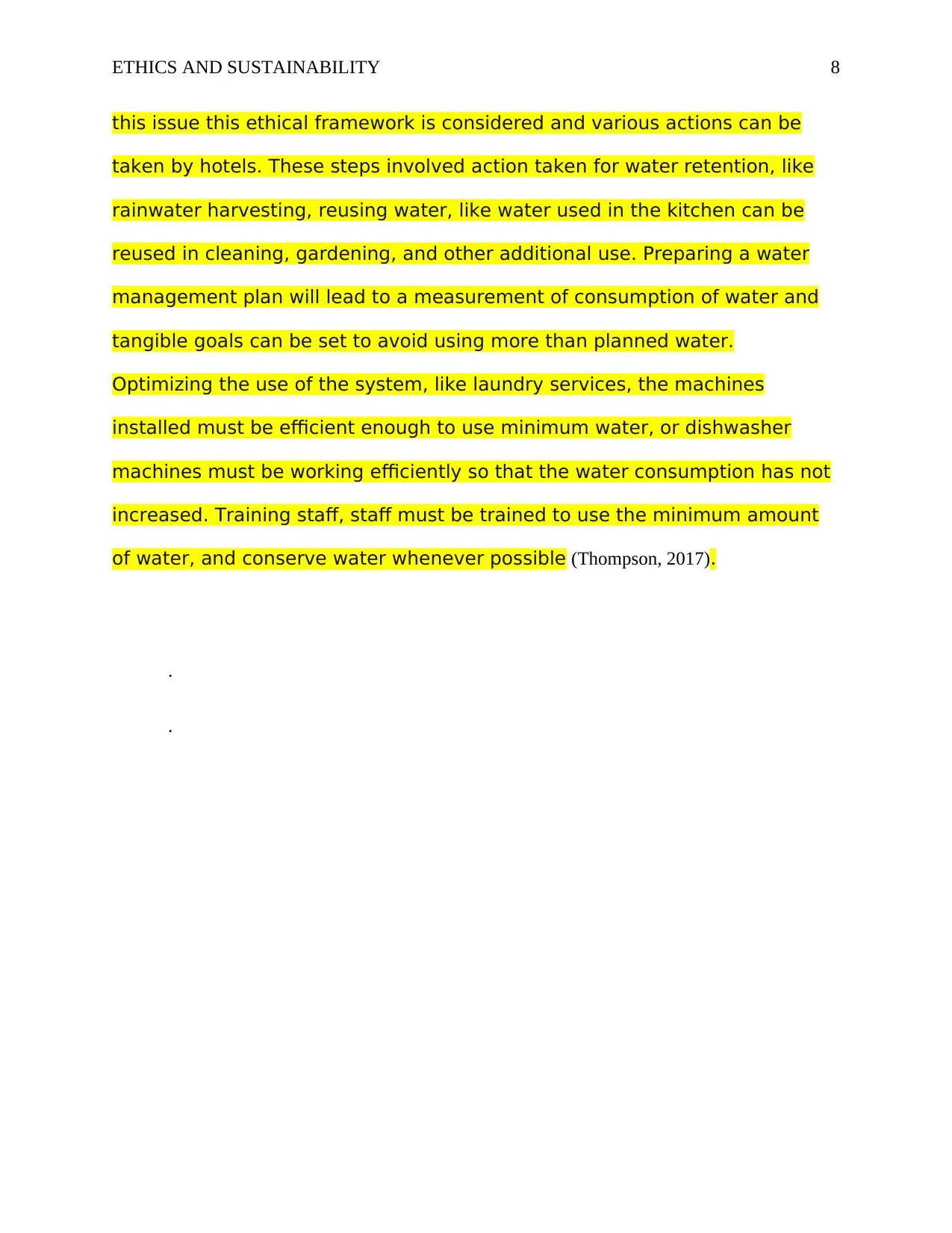
ETHICS AND SUSTAINABILITY 8
this issue this ethical framework is considered and various actions can be
taken by hotels. These steps involved action taken for water retention, like
rainwater harvesting, reusing water, like water used in the kitchen can be
reused in cleaning, gardening, and other additional use. Preparing a water
management plan will lead to a measurement of consumption of water and
tangible goals can be set to avoid using more than planned water.
Optimizing the use of the system, like laundry services, the machines
installed must be efficient enough to use minimum water, or dishwasher
machines must be working efficiently so that the water consumption has not
increased. Training staff, staff must be trained to use the minimum amount
of water, and conserve water whenever possible (Thompson, 2017).
.
.
this issue this ethical framework is considered and various actions can be
taken by hotels. These steps involved action taken for water retention, like
rainwater harvesting, reusing water, like water used in the kitchen can be
reused in cleaning, gardening, and other additional use. Preparing a water
management plan will lead to a measurement of consumption of water and
tangible goals can be set to avoid using more than planned water.
Optimizing the use of the system, like laundry services, the machines
installed must be efficient enough to use minimum water, or dishwasher
machines must be working efficiently so that the water consumption has not
increased. Training staff, staff must be trained to use the minimum amount
of water, and conserve water whenever possible (Thompson, 2017).
.
.
⊘ This is a preview!⊘
Do you want full access?
Subscribe today to unlock all pages.

Trusted by 1+ million students worldwide
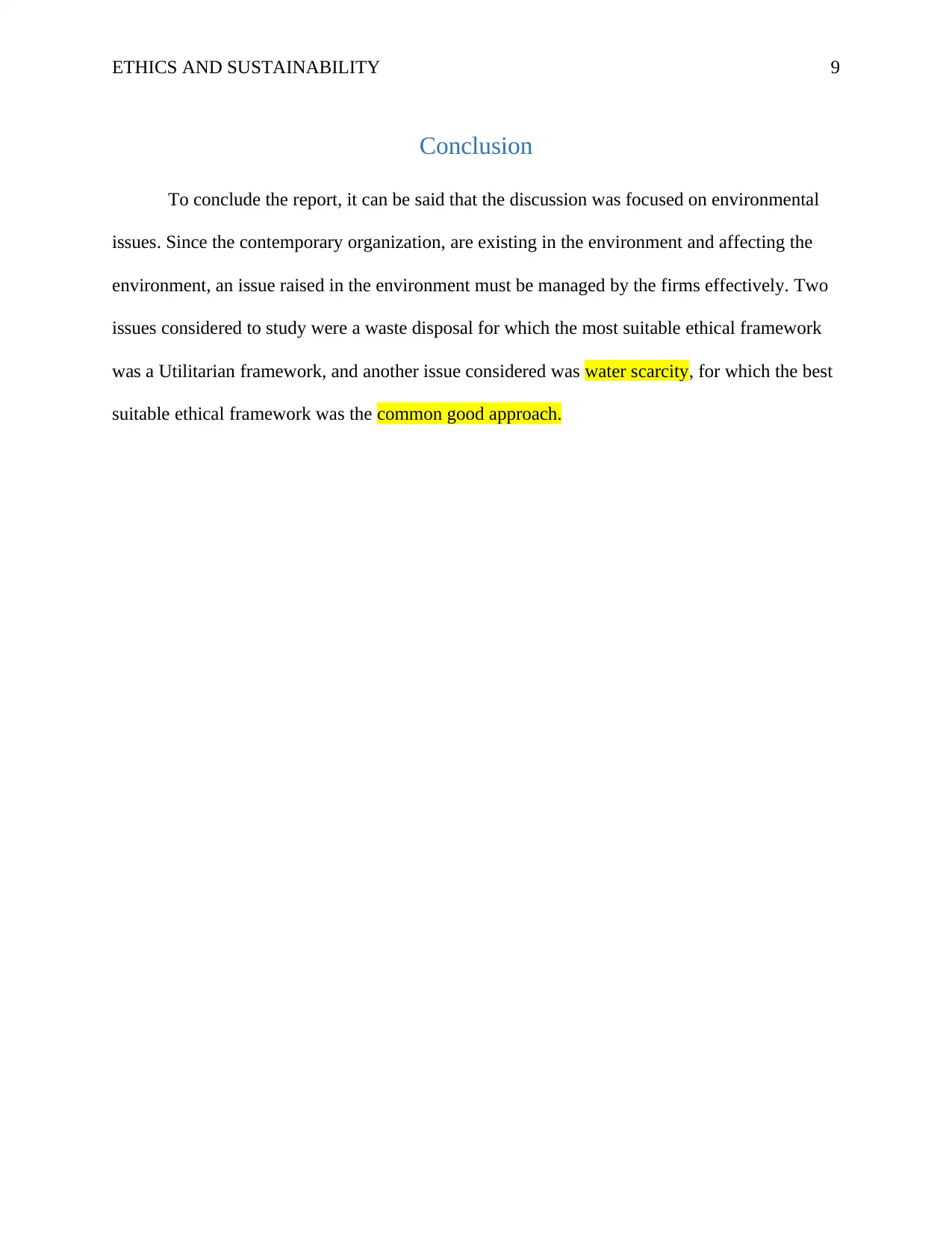
ETHICS AND SUSTAINABILITY 9
Conclusion
To conclude the report, it can be said that the discussion was focused on environmental
issues. Since the contemporary organization, are existing in the environment and affecting the
environment, an issue raised in the environment must be managed by the firms effectively. Two
issues considered to study were a waste disposal for which the most suitable ethical framework
was a Utilitarian framework, and another issue considered was water scarcity, for which the best
suitable ethical framework was the common good approach.
Conclusion
To conclude the report, it can be said that the discussion was focused on environmental
issues. Since the contemporary organization, are existing in the environment and affecting the
environment, an issue raised in the environment must be managed by the firms effectively. Two
issues considered to study were a waste disposal for which the most suitable ethical framework
was a Utilitarian framework, and another issue considered was water scarcity, for which the best
suitable ethical framework was the common good approach.
Paraphrase This Document
Need a fresh take? Get an instant paraphrase of this document with our AI Paraphraser
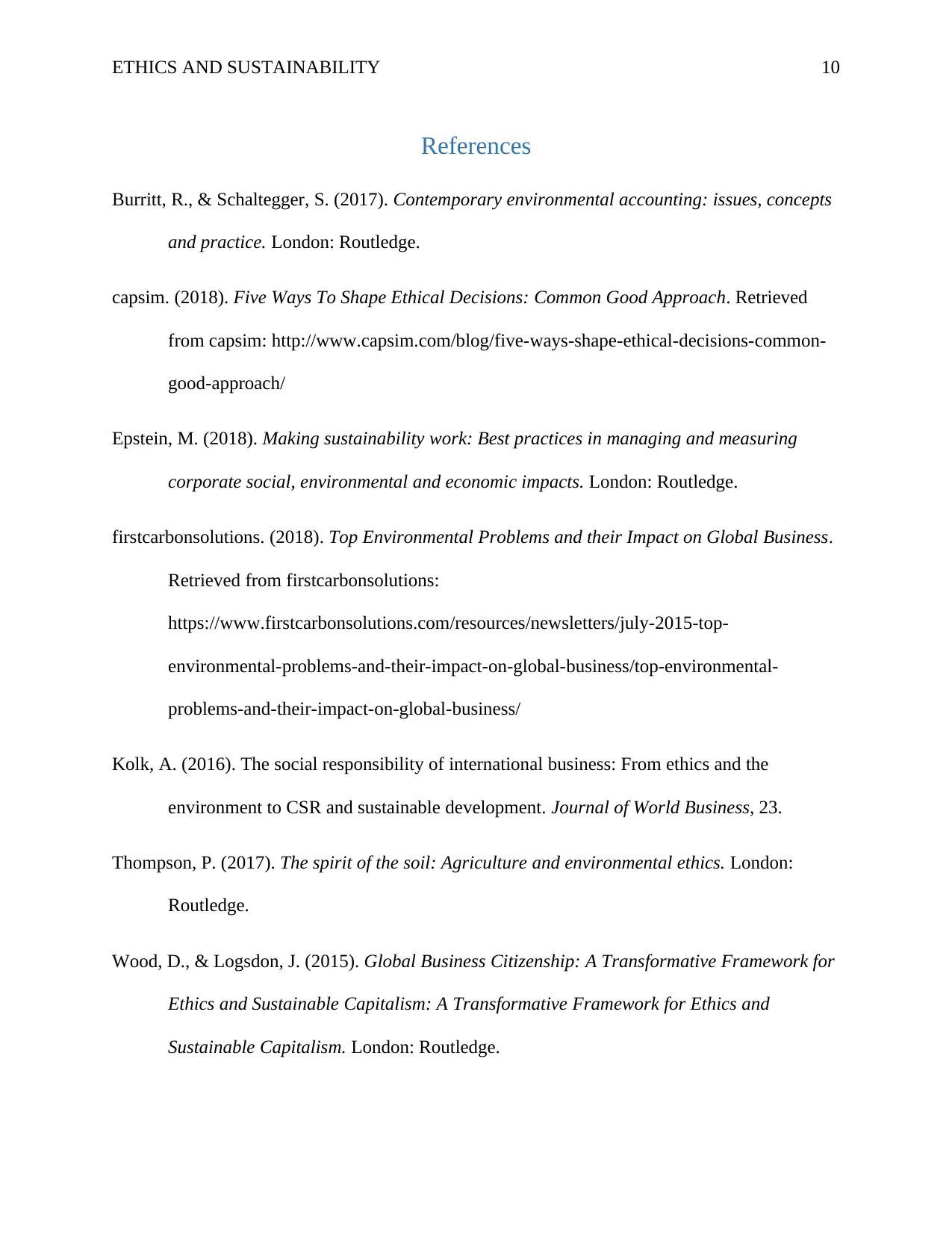
ETHICS AND SUSTAINABILITY 10
References
Burritt, R., & Schaltegger, S. (2017). Contemporary environmental accounting: issues, concepts
and practice. London: Routledge.
capsim. (2018). Five Ways To Shape Ethical Decisions: Common Good Approach. Retrieved
from capsim: http://www.capsim.com/blog/five-ways-shape-ethical-decisions-common-
good-approach/
Epstein, M. (2018). Making sustainability work: Best practices in managing and measuring
corporate social, environmental and economic impacts. London: Routledge.
firstcarbonsolutions. (2018). Top Environmental Problems and their Impact on Global Business.
Retrieved from firstcarbonsolutions:
https://www.firstcarbonsolutions.com/resources/newsletters/july-2015-top-
environmental-problems-and-their-impact-on-global-business/top-environmental-
problems-and-their-impact-on-global-business/
Kolk, A. (2016). The social responsibility of international business: From ethics and the
environment to CSR and sustainable development. Journal of World Business, 23.
Thompson, P. (2017). The spirit of the soil: Agriculture and environmental ethics. London:
Routledge.
Wood, D., & Logsdon, J. (2015). Global Business Citizenship: A Transformative Framework for
Ethics and Sustainable Capitalism: A Transformative Framework for Ethics and
Sustainable Capitalism. London: Routledge.
References
Burritt, R., & Schaltegger, S. (2017). Contemporary environmental accounting: issues, concepts
and practice. London: Routledge.
capsim. (2018). Five Ways To Shape Ethical Decisions: Common Good Approach. Retrieved
from capsim: http://www.capsim.com/blog/five-ways-shape-ethical-decisions-common-
good-approach/
Epstein, M. (2018). Making sustainability work: Best practices in managing and measuring
corporate social, environmental and economic impacts. London: Routledge.
firstcarbonsolutions. (2018). Top Environmental Problems and their Impact on Global Business.
Retrieved from firstcarbonsolutions:
https://www.firstcarbonsolutions.com/resources/newsletters/july-2015-top-
environmental-problems-and-their-impact-on-global-business/top-environmental-
problems-and-their-impact-on-global-business/
Kolk, A. (2016). The social responsibility of international business: From ethics and the
environment to CSR and sustainable development. Journal of World Business, 23.
Thompson, P. (2017). The spirit of the soil: Agriculture and environmental ethics. London:
Routledge.
Wood, D., & Logsdon, J. (2015). Global Business Citizenship: A Transformative Framework for
Ethics and Sustainable Capitalism: A Transformative Framework for Ethics and
Sustainable Capitalism. London: Routledge.
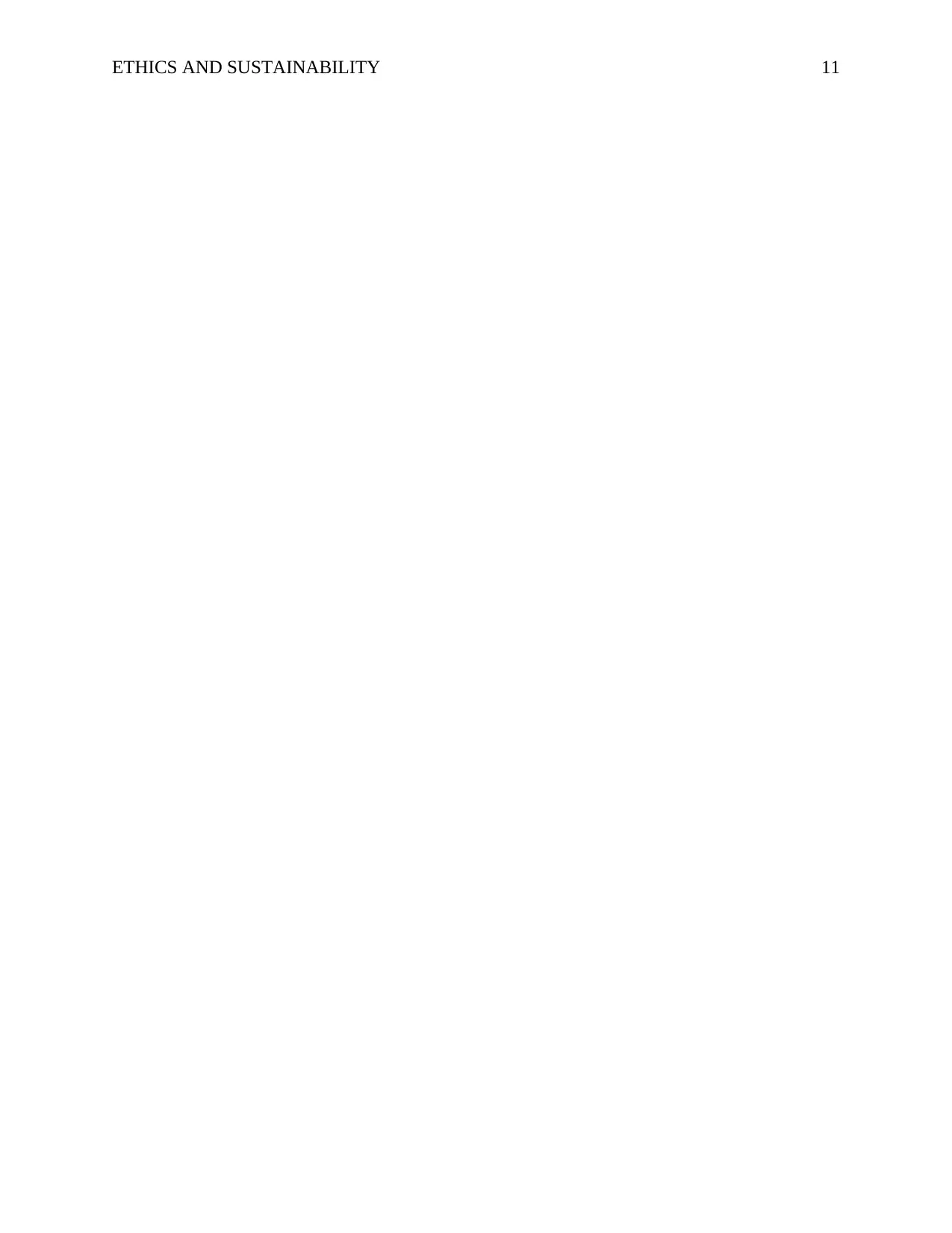
ETHICS AND SUSTAINABILITY 11
⊘ This is a preview!⊘
Do you want full access?
Subscribe today to unlock all pages.

Trusted by 1+ million students worldwide
1 out of 12
Related Documents
Your All-in-One AI-Powered Toolkit for Academic Success.
+13062052269
info@desklib.com
Available 24*7 on WhatsApp / Email
![[object Object]](/_next/static/media/star-bottom.7253800d.svg)
Unlock your academic potential
Copyright © 2020–2026 A2Z Services. All Rights Reserved. Developed and managed by ZUCOL.





